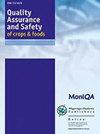Nanobiotechnology for agricultural sustainability, and food and environmental safety
IF 5.3
3区 农林科学
Q1 FOOD SCIENCE & TECHNOLOGY
引用次数: 25
Abstract
Agricultural development has become a requisite to meet the food security of an increasing world population under changing climate for eliminating poverty and hunger. Recently, scientists recognized that human wellness and healthy life are going to face challenges in the near future because of the vulnerability of agriculture and nat-ural resources. It is due to imbalance and unnecessary use of synthetic agricultural inputs in traditional farming systems. Therefore, improved agricultural technology has to ensure, in traditional farming, safe agricultural produce and bringing down of environmental pollution. Recently, nanotechnology (NT) has been recognized as a promising next-generation technology in the field of agriculture. As an environment-friendly and economically viable tool, the potentiality of nanomaterials (NMs), such as nanosensors, nanopesticides, nanofertilizers, nanocarriers, nanochips, and nano-packaging, has shown great prospect in improving safe agricultural productivity and upholding of environmental safety. Because the use of NMs decreases imbalance and unconscious utilization of synthetic fertilizers and pesticides, this minimizes the loss of nutrients and lead to improved agricultural productivity thru the smooth distribution of fertilizers and pesticides, and also improving water and nutrient effi-ciency. The current review concentrates on the utilization of NT for agricultural sustainability and environmental safety.纳米生物技术促进农业可持续性,以及食品和环境安全
农业发展已成为在不断变化的气候下满足日益增长的世界人口的粮食安全、消除贫困和饥饿的必要条件。最近,科学家们认识到,由于农业和自然资源的脆弱性,人类的健康和健康生活在不久的将来将面临挑战。这是由于在传统农业系统中不平衡和不必要地使用合成农业投入。因此,在传统农业中,提高农业技术必须保证农产品的安全,减少环境污染。近年来,纳米技术已被公认为是农业领域中具有发展前景的新一代技术。纳米传感器、纳米农药、纳米肥料、纳米载体、纳米芯片、纳米包装等纳米材料作为一种环境友好、经济可行的工具,在提高安全农业生产力和维护环境安全方面具有广阔的应用前景。由于NMs的使用减少了合成肥料和农药的不平衡和无意识利用,从而最大限度地减少了养分的损失,并通过肥料和农药的顺利分配提高了农业生产力,同时也提高了水和养分的效率。目前的综述主要集中在利用NT促进农业可持续性和环境安全。
本文章由计算机程序翻译,如有差异,请以英文原文为准。
求助全文
约1分钟内获得全文
求助全文
来源期刊

Quality Assurance and Safety of Crops & Foods
FOOD SCIENCE & TECHNOLOGY-
CiteScore
4.60
自引率
7.50%
发文量
61
审稿时长
1 months
期刊介绍:
''Quality Assurance and Safety of Crops & Foods'' is an international peer-reviewed journal publishing research and review papers associated with the quality and safety of food and food sources including cereals, grains, oilseeds, fruits, root crops and animal sources. It targets both primary materials and their conversion to human foods. There is a strong focus on the development and application of new analytical tools and their potential for quality assessment, assurance, control and safety. The scope includes issues of risk assessment, traceability, authenticity, food security and socio-economic impacts. Manuscripts presenting novel data and information that are likely to significantly contribute to scientific knowledge in areas of food quality and safety will be considered.
''Quality Assurance and Safety of Crops & Foods'' provides a forum for all those working in the specialist field of food quality and safety to report on the progress and outcomes of their research.
 求助内容:
求助内容: 应助结果提醒方式:
应助结果提醒方式:


